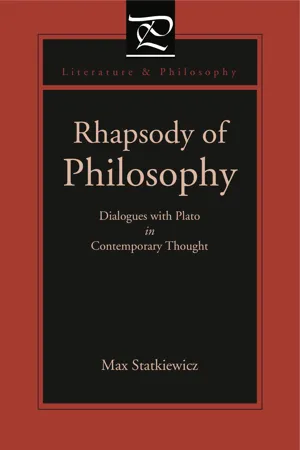
- English
- PDF
- Available on iOS & Android
About this book
This book proposes to rethink the relationship between philosophy and literature through an engagement with Plato's dialogues. The dialogues have been seen as the source of a long tradition that subordinates poetry to philosophy, but they may also be approached as a medium for understanding how to overcome this opposition. Paradoxically, Plato then becomes an ally in the attempt "to overturn Platonism," which Gilles Deleuze famously defined as the task of modern philosophy. Max Statkiewicz identifies a "rhapsodic mode" initiated by Plato in the dialogues and pursued by many of his modern European commentators, including Nietzsche, Heidegger, Irigaray, Derrida, and Nancy. The book articulates this rhapsodic mode as a way of entering into true dialogue (dia-logos), which splits any univocal meaning and opens up a serious play of signification both within and between texts. This mode, he asserts, employs a reading of Plato that is distinguished from interpretations emphasizing the dialogues as a form of dogmatic treatise, as well as from the dramatic interpretations that have been explored in recent Plato scholarship—both of which take for granted the modern notion of the subject. Statkiewicz emphasizes the importance of the dialogic nature of the rhapsodic mode in the play of philosophy and poetry, of Platonic and modern thought—and, indeed, of seriousness and play. This highly original study of Plato explores the inherent possibilities of Platonic thought to rebound upon itself and engender further dialogues.
Frequently asked questions
- Essential is ideal for learners and professionals who enjoy exploring a wide range of subjects. Access the Essential Library with 800,000+ trusted titles and best-sellers across business, personal growth, and the humanities. Includes unlimited reading time and Standard Read Aloud voice.
- Complete: Perfect for advanced learners and researchers needing full, unrestricted access. Unlock 1.4M+ books across hundreds of subjects, including academic and specialized titles. The Complete Plan also includes advanced features like Premium Read Aloud and Research Assistant.
Please note we cannot support devices running on iOS 13 and Android 7 or earlier. Learn more about using the app.
Information
Table of contents
- Front Cover
- Title Page
- Copyright
- Contents
- Acknowledgments
- A Polemic Introduction
- 1. Platonic Theater Rigor and Play in the Republic
- 2. Le Beau Jeu The Play of Beauty and Truth in the Phaedrus
- 3. The Notion of (Re)Semblance in the Sophist
- 4. The Abyssal Ground of World and Discourse in the Timaeus
- Rhapsodic Conclusion “The Dialogue That We Are” in Plato, Heidegger, and Nancy
- Selected Bibliography
- Index
- Back Cover